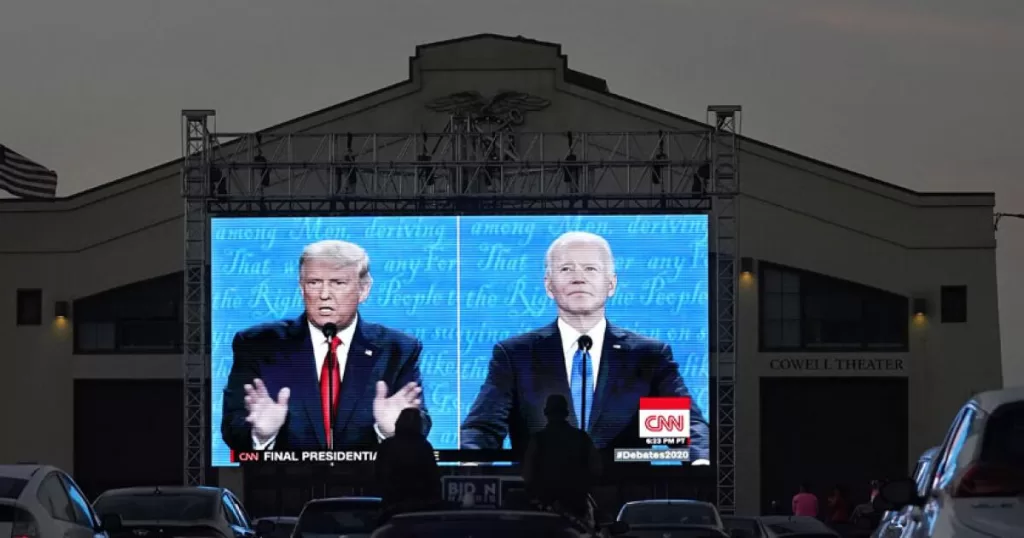Both he and President Biden are disliked by a majority of voters. Outside events — economic news, campus disturbances, Trump’s criminal trial in New York — don’t seem to nudge the numbers in either direction.
So it’s no mystery why the two candidates agreed last week to hold televised debates in June and in September. They’re both looking for something that can shake up the race.
The mystery is that each appears convinced that he’s the only one who can come out ahead.
Biden believes he can win if voters stop dwelling on their discontent with the economy and focus on the threat Trump poses to democracy and abortion rights. In the Biden team’s view, debates would display that head-to-head comparison starkly.
Trump claims that Biden is mentally unfit, says, “He can’t put two sentences together,” and seems to expect that the president will crumble under pressure on the debate stage.
They can’t both be right.
In an odd way, the candidates’ expectations for the debates reflect a similarity between their campaigns: Each hopes to win mainly by persuading voters to focus on the other guy’s flaws.
“Both are operating under the misplaced assumption that they can’t possibly lose to the other guy,” Republican pollster David Winston said.
They can’t both be right about that, either.
“We’ve gone from ‘yes we can’ to just ‘compare me to the alternative.’ ”
— Democratic speechwriter Eric Schnure
In his public appearances, Trump hardly bothers to appeal to voters who aren’t already devoted to him.
He doesn’t offer details of what he would do in a second term beyond broad promises to undo Biden’s policies, encourage oil companies to increase production (“drill, baby, drill!”) and deport millions of undocumented migrants.
At a raucous rally at a New Jersey beach town this month, the former president described Biden as “a total moron … surrounded by fascists.”
And he launched into a strange tribune to Hannibal Lecter, the murderous cannibal played by actor Anthony Hopkins in the 1991 film “The Silence of the Lambs.”
“The late, great Hannibal Lecter. He’s a wonderful man,” Trump said. “He oftentimes would have a friend for dinner. Remember the last scene? ‘Excuse me, I’m about to have a friend for dinner,’ as this poor doctor walked by. ‘I’m about to have a friend for dinner.’ But Hannibal Lecter. Congratulations.”
If you listened closely, the former president seemed to be suggesting that cannibals have entered the United States as undocumented migrants. But he never made that clear, perhaps because there have been no reports of upstanding citizens being eaten.
Trump made one potentially significant policy statement during that 87-minute speech: He said he favors an across-the-board tax cut — “middle class, upper class, lower class, business class.” But he offered no details, so what might have qualified as a substantive announcement got less media coverage than his musings on Hannibal Lecter.
Nine years after he began his first presidential campaign, Trump seems more bored than ever by policy details.
“He’s on TV every single day … but he isn’t using the time to communicate positively to the electorate,” Winston said.
Biden’s campaign, not surprisingly, has been more conventional. In his speeches around the country, the president tries to remind voters of record job creation over the last three years, which he calls “the great American comeback.” He extols his legislative accomplishments, including billions of dollars in funding for infrastructure projects, high technology and clean energy.
But he rarely talks about the two issues that have given him the most trouble, persistent high prices and surges in illegal immigration, even though many voters rank them as their top concerns.
And Biden has sharpened his attacks on Trump, warning that his election would “drag us backwards into … chaos, division and darkness.”
“He is driven by grievance and grift, focused on his own revenge and retribution, not the American people,” Biden said in March.
In recent weeks, he’s leavened the attacks with humor, calling Trump “Sleepy Don” — a reference to reports that the former president has dozed off in a Manhattan courtroom during trial.
Biden aides are candid about the underlying strategy. They want to make the election a “dual referendum” — one that weighs the two candidates against each other — instead of a referendum on Biden’s record.
They quote one of the president’s favorite lines: “Don’t compare me to the almighty, compare me to the alternative.”
As campaign slogans go, that’s not exactly enthralling, Democratic speechwriter Eric Schnure noted. “We’ve gone from ‘yes we can’ to just ‘compare me to the alternative,’ ” Schnure said, recalling then-President Obama’s motto in 2008.
But at least it acknowledges the kind of election we’re about to have: a choice between two imperfect, unpopular candidates. Many voters, perhaps most, won’t be choosing the candidate they admire more; they’ll be voting against the one they consider the greater danger. In short, an election for the Age of Trump.
